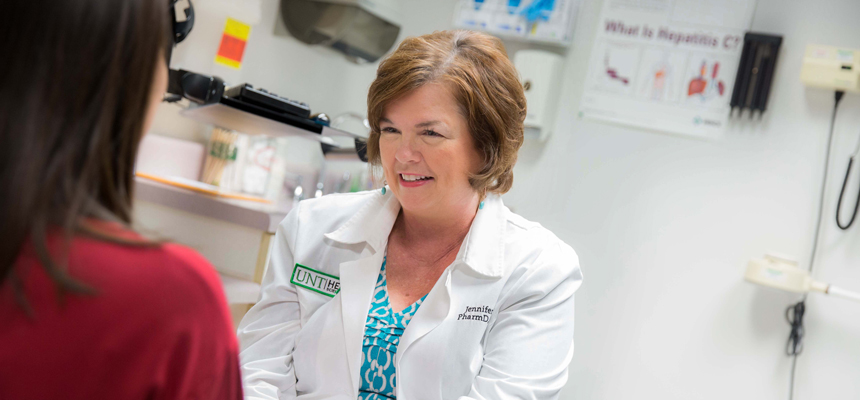Hepatitis C clinic shows future of pharmacy
By:Jan Jarvis

The medications cost close to $100,000, but they cure hepatitis C in 12 weeks or less.
And yet, some patients leave this costly prescription unused in their medicine cabinet.
A phone call from pharmacist Jennifer Fix, PharmD, can turn things around and get patients on a path towards a cure for this deadly disease.
“But non-adherence can prevent or delay a cure,” said Dr. Fix, Associate Professor of Pharmacotherapy at UNT Health Science Center. “Programs like ours improve adherence by close to 100 percent.”
The Hepatitis C Clinic at the UNTHSC Health Pavilion is unique because the person managing every patient’s care, in collaboration with the healthcare team, is a pharmacist. In this new model, pharmacists are part of the healthcare team and are no longer limited to working behind the counter.
Having a pharmacist-led hepatitis C service in the UNT Health Clinical Practice Group is groundbreaking, said Charles Taylor, Dean, UNT System College of Pharmacy. It integrates the pharmacist into the healthcare team, something that the profession has been moving toward for years, he said.
The pharmacy students of today have plenty of options to work in in clinics, hospitals and other ambulatory settings, said Dr. Randy Martin, Associate Chief of Pharmacy for the UNT Health Clinical Practice Group.
“They’re health care providers similar to a physician assistant,” Dr. Martin said. “It’s the future of pharmacy.”
Dr. Fix is one of six pharmacy faculty members embedded in a UNT Health medical practice. Working with doctors in the gastroenterology clinic, Dr. Fix assesses patients, makes treatment decisions, navigates insurance and the prior authorization system, orders lab work and follows each patient’s progress.
Most patients are already being treated at UNTHSC, but the program is open to the community as well.
Dr. Fix’s skills and expertise position her well to be an effective provider and navigator for these patients. Historically pharmacists have always been the medication expert on healthcare teams.
“Pharmacists live in the area of medication adherence, medication management, insurance and product selection,” Dr. Martin said.
While adherence is always important, it is essential when treating hepatitis C, which damages the liver. The direct acting antivirals that have revolutionized the treatment of hepatitis C are costly and must be taken correctly. Currently the drug is covered by insurance but only the sickest of patients meet the criteria for treatment.
Generally, one out of every four patients fail to take the medications that are prescribed for them, said Dr. Fix, who was a long-time community pharmacist before joining the UNT System College of Pharmacy.
“The healthcare outcome we are aiming for is that our Hepatitis-C patients are cured by taking the medications prescribed,” Dr. Fix said. “Most of the time they just need some encouragement that they can get through the eight to 12 weeks of treatment.”
UNT HealthAppointments: 817-735-3627 |





Social media